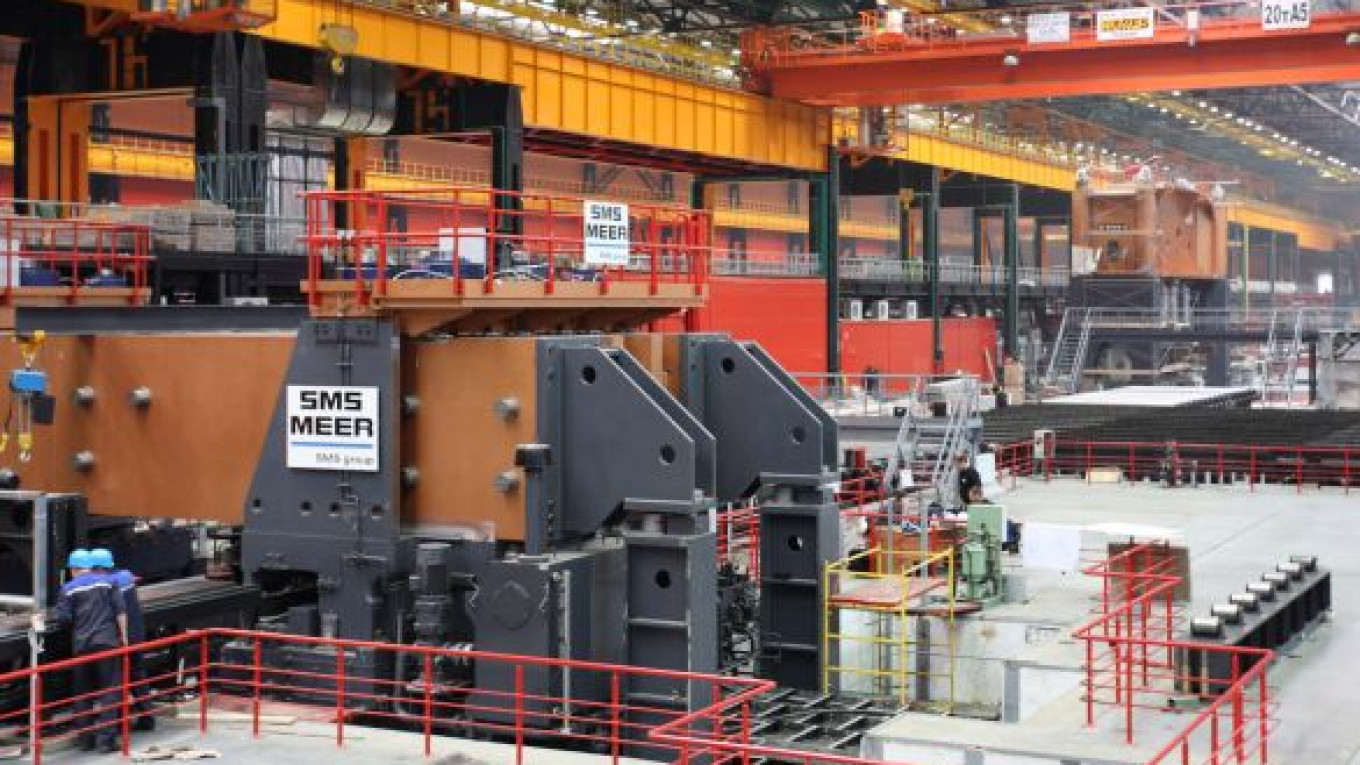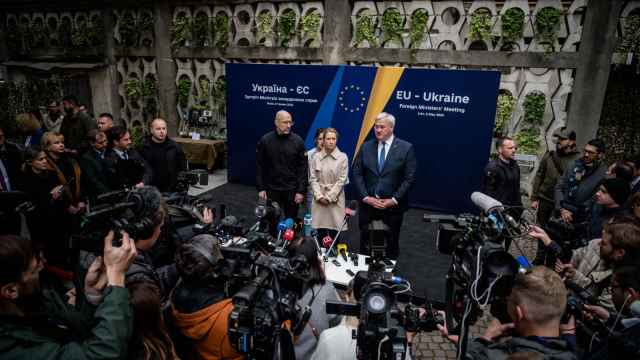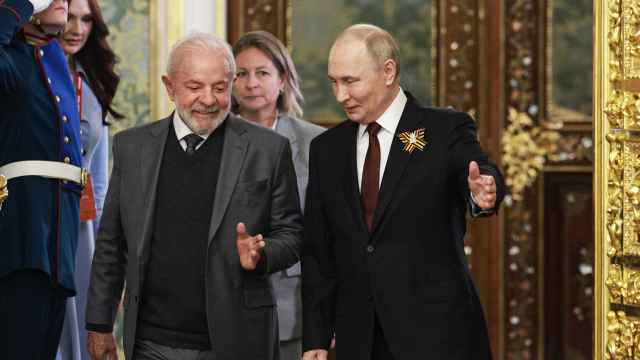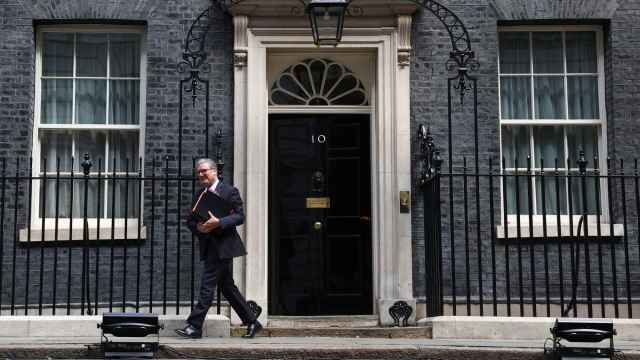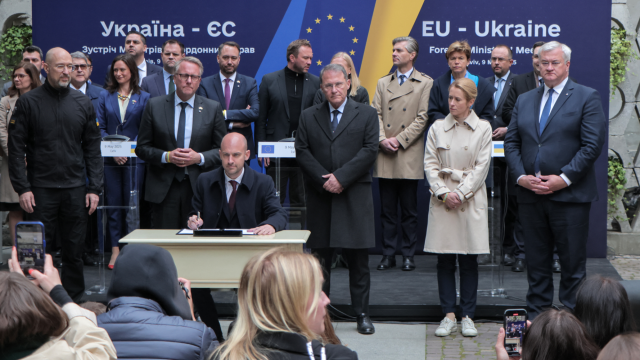ChTPZ Group, once the largest maker of steel pipes in Russia and now weighed down by $2.5 billion of debt, is preparing a dramatic recovery. Literally.
Billionaire owner and onetime theater administrator Andrei Komarov plans to double capacity and boost productivity with a new $700 million plant, the introduction of Toyota-style efficiency methods and an eye for the spectacular.
"It was Mr. Komarov's idea to paint gold all technological equipment at the new mill so it would resemble the mechanism of a giant Swiss watch," said Sergei Moiseyev, chief financial officer of the supplier to Gazprom.
The plant, tagged by ChTPZ as Russia's most modern, came under the scrutiny of Prime Minister Vladimir Putin when he visited Friday. "It felt as if I were in the theater or in Disneyland," he said after entering the site. "It's great."
Komarov, 43, needs more than chutzpah and the support of Putin to revive a business that, like other Communist-era producers, has lost sales to nimbler rivals. ChTPZ, which dates back to 1942 and is also known as ChelPipe, slipped to third place among the country's biggest pipe makers last year behind United Metallurgical Company, as its market share shrank to 16.5 percent, from 22.7 percent in 2005 and about 70 percent in the Soviet era.
The billionaire, who made his mark trading goods from cars to lingerie and is now deputy chairman of the Federation Council's Natural Resources Committee, is counting on a doubling in demand from Gazprom, which is building the 1,220-kilometer Nord Stream gas pipeline to Europe.
To commit to that wager, Komarov almost doubled ChTPZ's debt in the past three years, funding the pipe factory and a new steel plant to make the company self-sufficient in the metal.
"We plan to ride the surge in orders with our new mill and to pay back investments quickly," Moiseyev said. Komarov was not available for comment when Bloomberg called his Federation Council office.
The company's plans to start up the pipe facility, with an annual output capacity of 600,000 tons, were pushed back to Friday from last year by the world economic slump. ChTPZ cut production 23 percent in 2009 in response to the crisis.
"It would've been nice for ChTPZ to have this new facility in place half a year ago, when tenders on pipe supplies for Russia's major pipeline projects were held," VTB Capital analyst Olga Danilenko said. "Contracts to supply the second stage of Nord Stream have been awarded. Things will depend on whether Gazprom and Transneft will approve new large pipeline projects in the second half of 2011."
Rivals such as TMK, the country's biggest steel-pipe maker, and Vyksa Steel Works have large-diameter pipe orders booked until mid-2011 and are running at full capacity, while ChTPZ risks being underutilized in the "short term," she said.
Vyksa, United Metallurgical's biggest unit, said first-half output jumped one-third, with large-diameter pipes for Gazprom and Transneft, the national oil pipeline company, up 36 percent.
TMK said Jan. 29 that it would spend about $1.1 billion on plants by 2012. It will increase capacity for seamless pipes to 3.4 million tons and for large-diameter ones to 1.2 million tons, the company said in a presentation during President Dmitry Medvedev's visit to its Taganrog factory.
The global recession also strained borrowings at ChTPZ, which refinanced debt from Sberbank and received state guarantees for 5 billion rubles ($164 million) of loans. Komarov and his partners also sold a 58 percent stake in Chelyabinsk Zinc Plant.
Still, the billionaire has shown an ability to build a fortune from scratch, while innovating with management ideas new to Russia. After three years as chief administrator for the Satiricon Theater in Moscow from the age of 23, he made money trading goods and began buying workers' shares in the assets of ChTPZ, building those into a 40 percent stake by 1997. He also became Russia's largest developer of golf courses.
Komarov's listed Chelyabinsk Pipe Works, which controls his biggest mill, rose 56 percent in Moscow trading in the past year.
Even the all-white overalls for the 1,400 workers at the new plant are part of his attempt to instill the Japanese ethos of continuous improvement, or kaizen, to involve staff in increasing efficiency and generating ideas.
"It felt like a medical production. Everybody was wearing white," Putin said on his visit. "It's external, but still a sign of the production culture."
The factory, where employees get meals prepared by a chef trained in Spain as well as programs to quit smoking, is surrounded by groomed lawns.
"The exotic designs at ChTPZ may be good from the standpoint of corporate culture but are unlikely to boost sales," IFC Metropol analyst Andrei Lobazov said.
Whether ChTPZ doubles output, Komarov is not alone in forecasting burgeoning demand. Use of large-diameter pipes, the most profitable segment, will grow to as much as 3 million tons by 2012 from 1.4 million tons last year, according to Russia's Pipe Industry Development Fund.
A Message from The Moscow Times:
Dear readers,
We are facing unprecedented challenges. Russia's Prosecutor General's Office has designated The Moscow Times as an "undesirable" organization, criminalizing our work and putting our staff at risk of prosecution. This follows our earlier unjust labeling as a "foreign agent."
These actions are direct attempts to silence independent journalism in Russia. The authorities claim our work "discredits the decisions of the Russian leadership." We see things differently: we strive to provide accurate, unbiased reporting on Russia.
We, the journalists of The Moscow Times, refuse to be silenced. But to continue our work, we need your help.
Your support, no matter how small, makes a world of difference. If you can, please support us monthly starting from just $2. It's quick to set up, and every contribution makes a significant impact.
By supporting The Moscow Times, you're defending open, independent journalism in the face of repression. Thank you for standing with us.
Remind me later.


